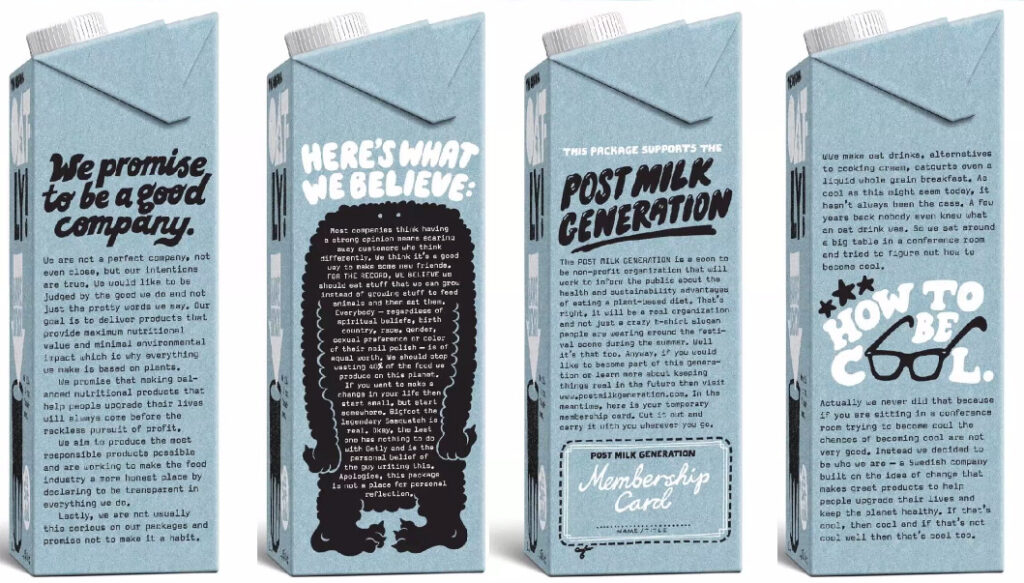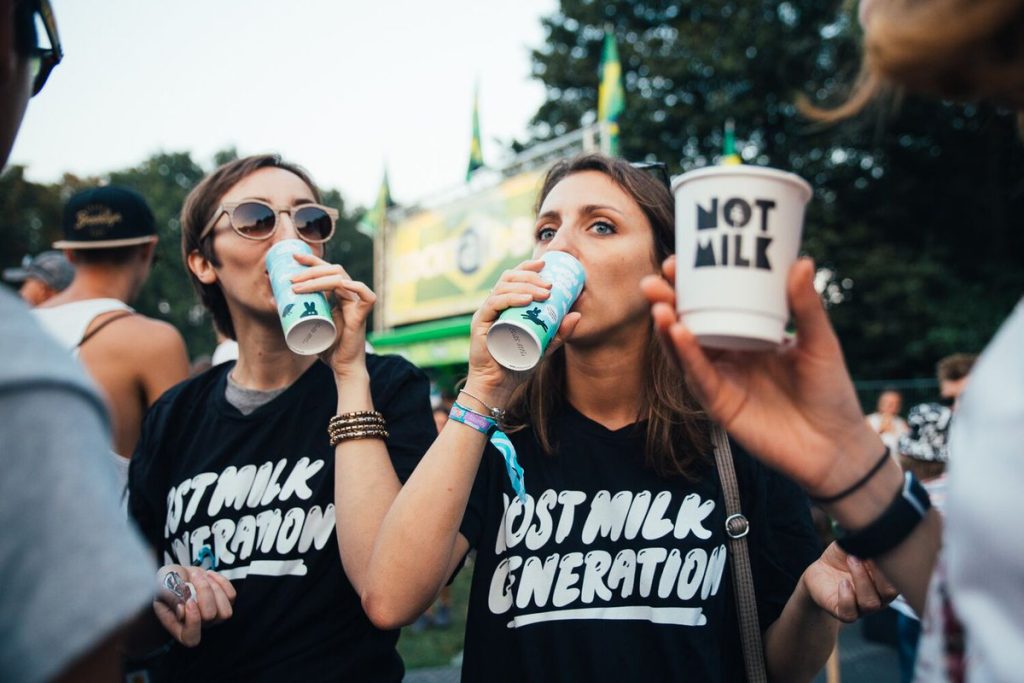5 Mins Read
A UK court has dealt a blow to Oatly by ruling that ‘milk’ should not be used on plant-based products, in what is a big win for Big Dairy.
A year after Oatly won the legal right to keep using the term ‘milk’ in its marketing, an appeals court has overturned the ruling, essentially banning the use of dairy-like descriptors on all plant-based products in the UK.
The Court of Appeal in London decided that the Swedish oat milk giant can’t use its ‘Post Milk Generation’ trademark on product packaging because ‘milk’ is a legally protected term reserved for dairy. Doing so would offend British trademark regulations and a 2013 EU regulation of sales descriptors for agricultural products.
The latter defines milk as “exclusively the normal mammary secretion obtained from one or more milkings without either addition thereto or extraction therefrom”, stating that the term ‘milk’ can only be used for products “derived exclusively for milk”.
The EU law has long been a thorny issue in the region’s food industry, where meat analogues are allowed to use meat-related terms on labelling, but non-dairy products are not permitted to do the same for their counterparts.
“Disappointingly, this ruling overturns the common sense we saw from the High Court earlier this year when they ruled in our favour,” said Bryan Carroll, general manager for Oatly UK & Ireland. “Be under no illusion that making it harder to label and find dairy alternatives benefits the interests of Big Dairy and Big Dairy alone.”
Oatly ‘doesn’t clearly describe’ that its products are non-dairy

The original case dates back five years and relied upon the pre-Brexit EU law, which protects words like ‘milk’ and ‘cheese’. Oatly had previously attempted to trademark the slogan with the UK’s Intellectual Property Office (IPO) in 2019, but Dairy UK – an association representing milk producers – had argued that the use of ‘Post Milk Generation’ was in violation of EU legislation.
In January 2023, the IPO found that consumers were unlikely to be confused by the word ‘milk’ in the phrase – as had been argued by Dairy UK – but only granted the trademark for T-shirts, not food and drink packaging.
The oat milk maker successfully appealed this decision in the High Court in December last year, where a judge in the High Court ruled that Dairy UK’s interpretation was too broad and wasn’t something that would confuse consumers.
But the new ruling by the Court of Appeal supports the IPO’s original decision. The trademark “does not clearly describe a characteristic quality of the goods in question”, argued Justice Richard Arnold. He noted that the trademark may allude to “the fact that the goods are non-dairy products, but it does not clearly describe any such characteristic”.
The judges also considered whether Oatly can use the term ‘milk-free’ on its products, a claim that even Dairy UK did not contend. But they decided it wasn’t necessary to rule on that issue in this appeal.
“This unanimous decision reinstates the Intellectual Property Office’s original decision, which declared the trade mark invalid for oat-based products,” said Dairy UK CEO Judith Bryans. “This ruling clarifies the legal protection of dairy terms, according to which the term ‘milk’ is reserved for dairy milk, except in defined circumstances.”
Marisa Heath, CEO of trade group Plant-Based Food Alliance which Oatly is a part of), said: “We don’t believe the judgement is in the best interests of consumers and that should be the key priority. The term ‘dairy designation’ clearly has too wide an interpretation and Oatly are not calling themselves milk – they are saying they are ‘post milk’.
Big blow for plant-based milk in the UK

This latest judgement is a big blow to the plant-based milk sector in the UK. While Oatly can still appeal the decision at the Supreme Court, the Court of Appeal’s ruling is binding on all other courts and effectively makes it illegal for vegan brands to use dairy-like terms.
“[Big Dairy’s] cynical attempts to stifle competition through legal action contradicts the interests of the British consumer, creates an uneven playing field for plant-based products and worst of all: it delays progress in shifting the public towards more sustainable diets,” said Oatly’s Carroll. “We will always stand up for what is right and we are considering our options.”
Echoing this, Heath added: “I think this is a waste of time and we should be focusing on producing better and more sustainable food to tackle issues facing us globally around climate change and health.”
This comes amid efforts to extend the current restrictions on plant-based dairy labelling in the UK. The Food Standards Information Focus Group, a group of trading standards officers, has been pushing for guidance that could prohibit non-dairy products from featuring descriptors like ‘not milk’, ‘cheeze’, ‘mylk’, ‘yoghurt-style’ and even ‘semi’ or ‘whole’ to describe the content.
Plant-based labelling has been a heated battle across the globe for the last decade. Livestock interest groups have been largely successful in their efforts to get bans and restrictions introduced on vegan products, citing consumer confusion. But the evidence for that argument is lacking.
A 2022 survey found that only 17% of Brits were confused about whether ‘plant-based’ foods contain dairy or eggs, while a 2020 study suggested that omitting animal-related words can actually cause more confusion about the taste and use of vegan products.
And earlier this year, a 2,000-person poll found that only 20% of Brits have confused plant-based foods with animal products due to branding or labelling, although it noted that 38% of UK consumers believe vegan companies should not be allowed to use animal-related terms.
Meanwhile, lawmakers in Turkey have introduced similar restrictions on plant-based meat and dairy products, prohibiting them from using terms like ‘tastes like butter/chicken’ and ‘dairy-free’.



